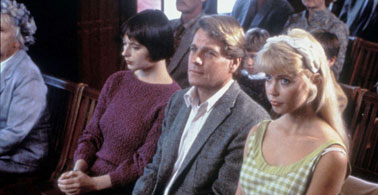Curiously, the Chicago Reader’s web site dates this capsule review in October 1985, two years before the film was made. I first saw it at the Toronto Film Festival in September 1987, and believe I reviewed it not too long afterwards. — J.R.

Norman Mailer’s best film, adapted from his worst novel, shows a surprising amount of cinematic savvy and style from a writer whose previous film efforts (Wild 90, Beyond the Law, Maidstone) were mainly unvarnished recordings of his own improvised performances. Working for the first time with a mainstream crew and budget and without himself as an actor, he translates his high rhetoric and macho preoccupations (existential tests of bravado, good orgasms, murderous women, metaphysical cops) into an odd, campy, raunchy comedy thriller that remains consistently watchable and unpredictable — as goofy in a way as Beyond the Valley of the Dolls. Where Russ Meyer featured women with oversize breasts, Mailer features male characters with oversize egos (although the women here also do pretty well in that department), and thanks to the juicy writing, hallucinatory lines such as “Your knife is in my dog” and “I just deep-sixed two heads” bounce off his cartoonish actors like comic-strip bubbles; even his sexism is somewhat objectified in the process. Read more
From the January 25, 2007 issue of the Chicago Reader. — J.R.
INLAND EMPIRE ****
DIRECTED AND WRITTEN BY DAVID LYNCH WITH LAURA DERN, JUSTIN THEROUX, JEREMY IRONS, KAROLINA GRUSZKA, HARRY DEAN STANTON, AND GRACE ZABRISKIE

David Lynch’s first digital video, almost three hours long, resists synopsizing more than anything else he’s done. Some viewers have complained, understandably, that it’s incomprehensible, but it’s never boring, and the emotions Lynch is expressing are never in doubt. Asked many years ago about the origins of the nightmarish Eraserhead (1978), his first and best feature, he forthrightly replied, “Philadelphia.” If asked the same thing today about the no less nightmarish Inland Empire, he might say, “Hollywood.”
Many of my colleagues believe Lynch’s best early feature is Blue Velvet (1986), which I regard as a gripping but limited piece of designer porn. Like his more offensive Wild at Heart and his more charming TV series Twin Peaks (both 1990), Blue Velvet offers a vivid illustration of how a man can turn his most lurid puritanical obsessions into clout and big money — and get an audience to wallow in those obsessions without thinking about them very hard. It has little of the meditative integrity and private intensity of Eraserhead, but then little in his work before Inland Empire did. Read more
The following article, which originally appeared in the April 20, 1990 issue of the Chicago Reader, without any star rating, is the only time I can recall writing at length in the Reader about an American TV series. (An edited version of this piece appears in a 1995 collection edited by David Lavery for Wayne State University Press, Full of Secrets: Critical Approaches to Twin Peaks, under the title “Bad Ideas: The Art and Politics of Twin Peaks“.) From a vantage point of almost two decades later, I wouldn’t be as quick today to insist that David Lynch’s work is devoid of any social commentary. What he has to say about the Hollywood community alone, especially in Inland Empire (2006), shows that he’s no longer as detached as he was.
Another invaluable tool for re-evaluation is the recent and superbly appointed Blu-Ray box set devoted to Twin Peaks. Despite some misgivings about the show’s second season (see, for instance, Martha Nochimson’s demurrals in her 1997 The Passion of David Lynch about some of the ways the show “perverted” Lynch’s original designs and conceptions), I continue to find much of it very absorbing. The same is true, so far, about the so-far uneven third season, despite the brilliance of the third episode. Read more


